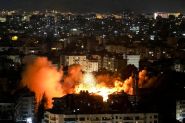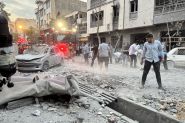- Home
- War in the Middle East
- In Southern Lebanon, Telecoms Are Provided by the Hezb

In southern Lebanon, the GSM network has been decommissioned in several areas where Hezbollah is omnipresent, in favor of the pro-Iranian group's private telecommunications network.
For those who don't know, Hezbollah has its own telecommunications network, set up long before the July 2006 war with Israel.
In fact, during that war, this underground network enabled its cadres to maintain contact with each other. And it was, incidentally, because of this network — more precisely, because Fouad Siniora's government had tried, two years later, to investigate this illegal web of cables, which was costing the Lebanese state millions of dollars and posing a real security problem — that Hezbollah invaded Beirut and occupied the offices of the Future Movement. That was on May 7, 2008.
Today, Hezb cadres and fighters have abandoned the official network in favor of their own, which they consider more secure.
In one of his latest speeches, their leader, Hassan Nasrallah, expressly asked the inhabitants of southern Lebanon to disconnect the surveillance cameras from their telephones and computers and to stop using all these devices, especially cell phones, pointing out that the Israelis are in the process of locating their targets in Lebanon, thanks to the cell phone network.
This measure is all the more important given that the UNIFIL command recently warned Lebanese security officials that the town of Nabatiyeh, where a family was decimated in an Israeli bombardment last Wednesday, had become a target for Tel Aviv. The Hebrew state considers that Hezbollah is violating the rules of military engagement, which would allow it to widen the scope of its targets. It had struck Nabatiyeh to liquidate one of the leaders of Hezbollah's elite al-Radwane force, Ali Debs.
For its part, UNIFIL is doing its utmost to prevent any escalation. Its command is stepping up contacts with the relevant authorities in Lebanon and Israel, in the hope of revitalizing the monthly tripartite meetings in Naqoura. It hopes that a resumption of these meetings will pave the way for the implementation of UN Security Council Resolution 1701, particularly on the Israeli side, to ensure that Tel Aviv ceases its regular violations of Lebanese airspace. At the same time, Lebanon would begin to implement its part of the agreement, which concerns the withdrawal of weapons and combatants as far north as the Litani River. But we're not there yet.
For those who don't know, Hezbollah has its own telecommunications network, set up long before the July 2006 war with Israel.
In fact, during that war, this underground network enabled its cadres to maintain contact with each other. And it was, incidentally, because of this network — more precisely, because Fouad Siniora's government had tried, two years later, to investigate this illegal web of cables, which was costing the Lebanese state millions of dollars and posing a real security problem — that Hezbollah invaded Beirut and occupied the offices of the Future Movement. That was on May 7, 2008.
Today, Hezb cadres and fighters have abandoned the official network in favor of their own, which they consider more secure.
In one of his latest speeches, their leader, Hassan Nasrallah, expressly asked the inhabitants of southern Lebanon to disconnect the surveillance cameras from their telephones and computers and to stop using all these devices, especially cell phones, pointing out that the Israelis are in the process of locating their targets in Lebanon, thanks to the cell phone network.
This measure is all the more important given that the UNIFIL command recently warned Lebanese security officials that the town of Nabatiyeh, where a family was decimated in an Israeli bombardment last Wednesday, had become a target for Tel Aviv. The Hebrew state considers that Hezbollah is violating the rules of military engagement, which would allow it to widen the scope of its targets. It had struck Nabatiyeh to liquidate one of the leaders of Hezbollah's elite al-Radwane force, Ali Debs.
For its part, UNIFIL is doing its utmost to prevent any escalation. Its command is stepping up contacts with the relevant authorities in Lebanon and Israel, in the hope of revitalizing the monthly tripartite meetings in Naqoura. It hopes that a resumption of these meetings will pave the way for the implementation of UN Security Council Resolution 1701, particularly on the Israeli side, to ensure that Tel Aviv ceases its regular violations of Lebanese airspace. At the same time, Lebanon would begin to implement its part of the agreement, which concerns the withdrawal of weapons and combatants as far north as the Litani River. But we're not there yet.
Read more



Comments